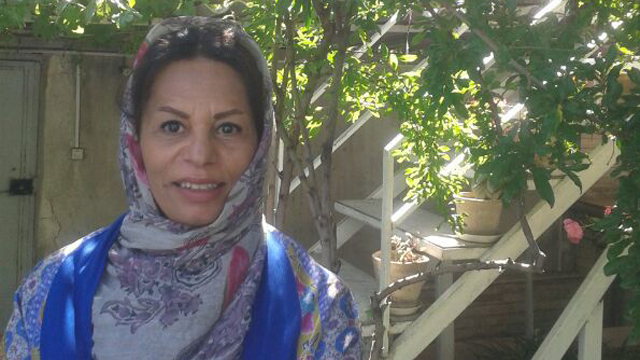Guilt by Association: Peaceful Demonstrators Slapped with Suspended Lashing and Prison Sentences

Some of the accused were falsely declared followers of an imprisoned spiritual leader.
Fourteen people have been handed suspended prison and flogging sentences for allegedly calling for the release of imprisoned spiritual leader Mohammad Ali Taheri, but five of the accused are actually civil rights activists who were rounded up at the same time as Taheri’s supporters.
A student of Taheri’s, Zahra Sadat Ebrahimi, told the International Campaign for Human Rights in Iran that 14 people were put on trial as a group of Taheri’s students on March 8, 2016, “but five of the defendants had nothing to do with him—they are civil rights activists. But the court bunched us together and paid no attention to their statements, or their lawyers’ objections, and all of us got the same sentence.”
“A number of Mohammad Ali Taheri’s students and sympathizers gather in front of Evin Prison every week to protest his imprisonment and death sentence, which has now been rescinded,” said Ebrahimi. “These protests were always peaceful and carried out in silence. We only carried banners and held them in front of the prison. On November 23, 2015 we were supposed to have another gathering, but agents arrested us.”
“We had no gathering on that day. When I got out of the car, agents arrested me. Another woman was dragged out of a taxi. The agents had identified us in gatherings during the previous weeks. We were all taken to the Vozara detention center [in Tehran] and from there to Evin Prison. The judge insisted that we had been paid by Mr. Taheri to hold protest rallies for him. When I objected, the judge threatened to sentence me to seven years in prison,” she said.
Ebrahimi added that 10 women including herself and four men have each been sentenced to three months in prison and 10 lashes, suspended for two years, by Branch 1044 of the Criminal Court in Tehran Province for “disturbing the public order by participating in an illegal gathering in support of the head of the Erfan-e Halgheh sect,” which is led by Taheri.
Iran’s security establishment has come down hard on Taheri and supporters of the Erfan-e Halgheh spiritual group, viewing it and any other alternative belief system, especially those seeking converts, as a threat to the prevailing Shia order.
The detained men were kept in Evin Prison and the women were transferred to Gharchak Prison in the city of Varamin just outside of Tehran. Ebrahimi said she was released on 500 million rials ($16,200 USD) bail after 15 days.
Mohammad Ali Taheri, 60, founder of the Erfan-e Halgheh (Spiritual Circle) Institute in Tehran, was arrested on May 4, 2010 and charged with “insulting the sacred,” “immoral contact with women” and “carrying out illegal medical procedures.” He was sentenced to five years in prison along with 74 lashes and fined nine billion rials (nearly $300,000 USD). Taheri was later prosecuted for “blasphemy” in connection with his books and sentenced to death for spreading “corruption on earth,” but Iran’s Supreme Court overturned the sentence in December 2015.
Taheri was due to be released in March 2016 after completing a five-year prison sentence, but was interrogated and charged again with “corruption on earth” and for allegedly holding membership in a banned militant Marxist organization.
In a separate incident, 18 followers of Taheri were arrested in front of Evin Prison on November 21, 2015 and were each sentenced to 91 days in prison and 74 lashes by Branch 1060 of the Tehran Criminal Court on February 22, 2016.
They included Simin Eyvazzadeh and Hashem Zeinali, who don’t follow Taheri, but were nevertheless arrested with the group of his followers. Eyvazzadeh was protesting the arrest of her son, Omid Alishenas, and Zeinali was demanding answers about his son, Saeed Zeinali, who disappeared in 1999 after being arrested.
Zeinali’s wife, Akram Neghabi, told the Campaign in February 2016 that on the day of her husband’s arrest he was holding a picture of their missing son and that he was not there because of Taheri.
“The judge in this case is irrelevant,” said Neghabi. “It was the interrogators who wanted this punishment for my husband. They know very well that my husband is not a follower of Mr. Taheri and he was not in front of Evin Prison to defend him.”






